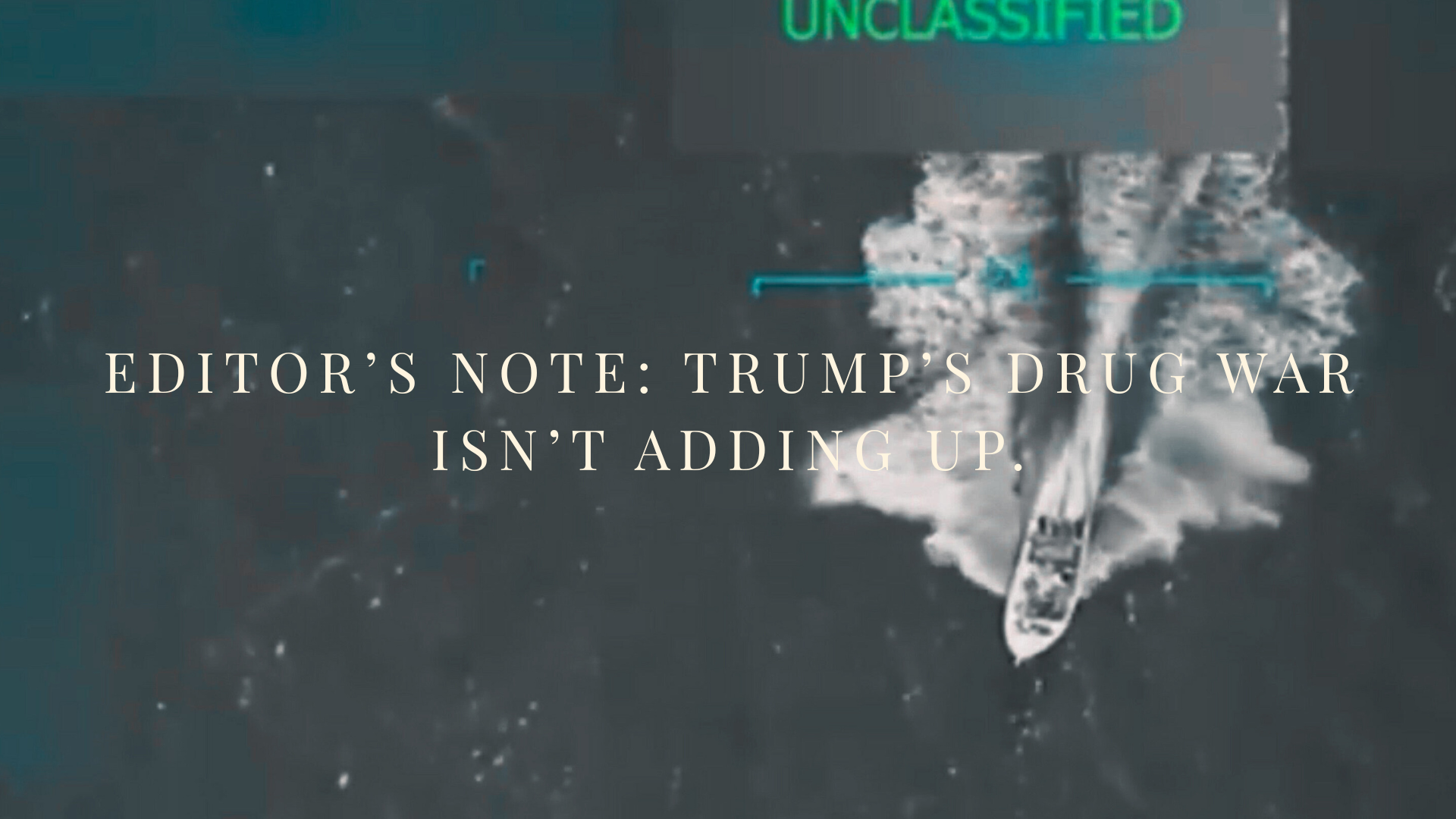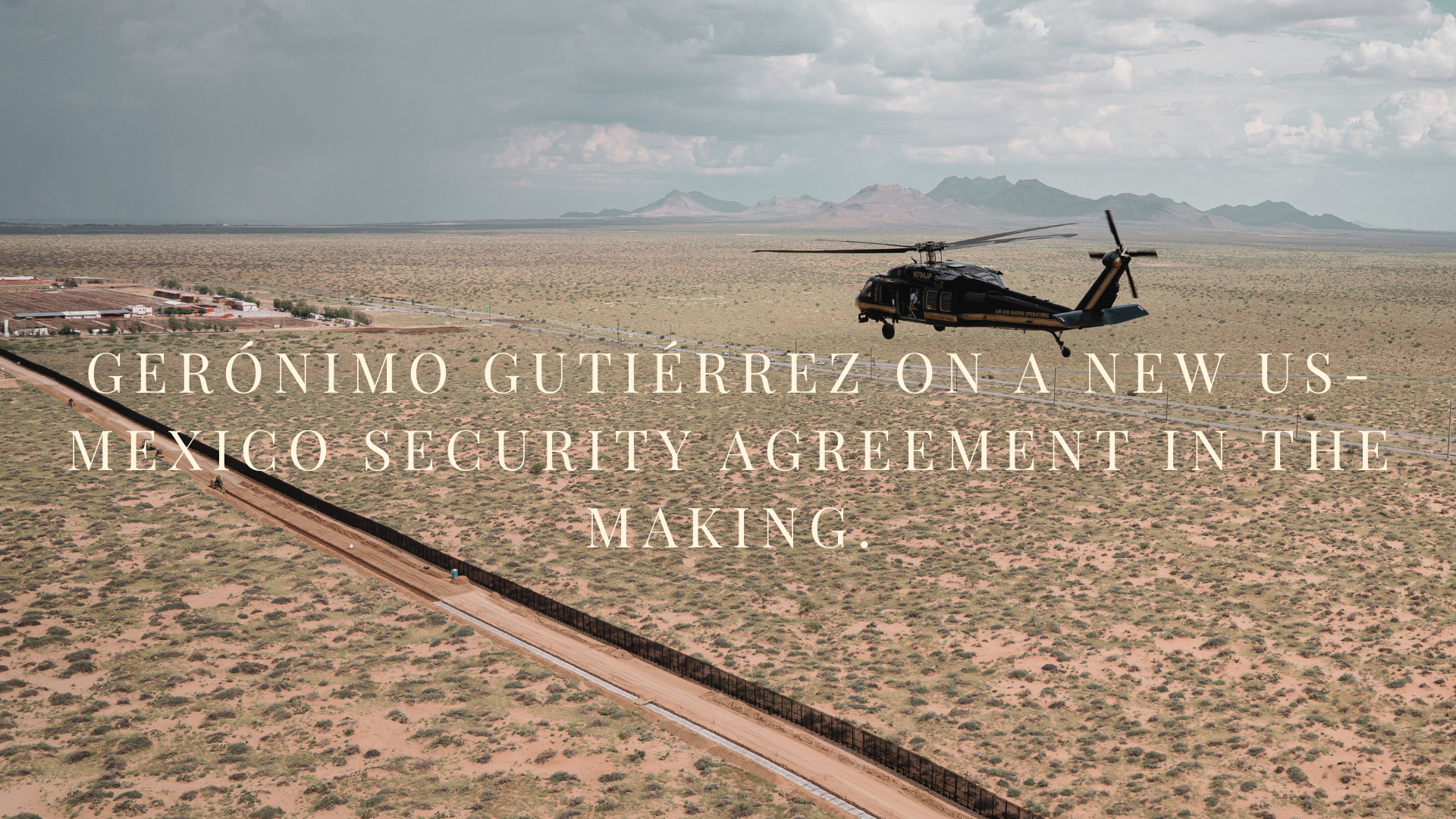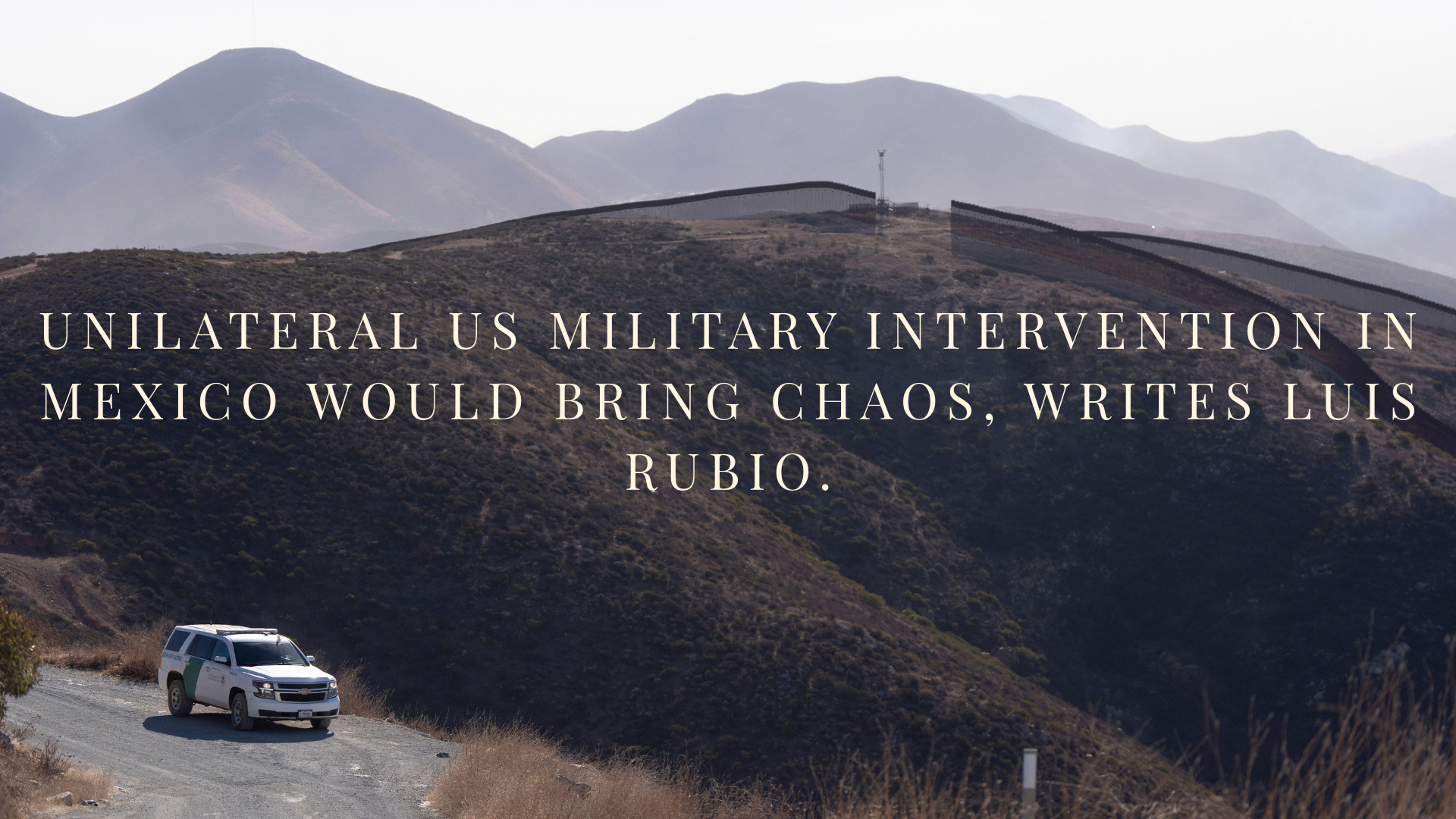
Trump’s drug war isn’t adding up
by Andrew Law, editor and founder.
I want to pause this week to point out an incongruity in the Trump administration’s supposed war on drug trafficking that is posing challenges around how we best cover this key topic. This isn’t my usual kind of column, but I hope you’ll bear with me.
The press — and I think most people generally on both sides of the border — see Trump as having gone hard on traffickers. The militarized southern border, the arm-twisting of Sheinbaum and her MORENA allies, downgrading Colombia, and of course, the bombing of passenger boats in the Caribbean. Last week, I highlighted rumors that the fuel theft scandal engulfing Mexico’s Navy (and discussed in more detail this week by Luis Rubio) is being propelled by leaks out of Washington. It all gives the impression of a major realignment of US security posture. But when you zoom in, it just doesn’t hang together…

A new US - Mexico security agreement in the making
by Gerónimo Gutiérrez. Ambassador Gutiérrez served as Mexico’s Ambassador to the United States and as Mexico’s Deputy Secretary for Governance and Homeland Security.
—
Last week tensions between the US and Mexico governments surfaced again. President Sheinbaum denied the existence of an agreement between the Drug Enforcement Agency and the Mexican government. Her comments were directed towards a press release from the DEA announcing the launch of a “bold bilateral initiative to dismantle cartel gatekeepers and combat synthetic drug trafficking”. In my view, the rebuttal appears to be more the result of miscommunication than of the lack of willingness on both sides to strengthen cooperation. In fact, Sheinbaum confirmed that some form of security agreement is in the making and could be formalized in the next few weeks during a visit to Mexico of Secretary of State Marco Rubio. This was overlooked and could potentially be good news. Here are four takeaways of last week’s episode…

Unilateral US military intervention in Mexico would bring chaos
by Luis Rubio, political analyst and chairman of México Evalúa.
For months, talk has been circulating about a possible US military intervention in Mexico. The idea has gained traction here due to the presence of American intelligence ships in the Gulf of California and, more recently, the sighting of a drone over Valle de Bravo. The issue is also alive in the United States, at least since several Mexican criminal organizations were designated as terrorist groups. In fact, the debate has been simmering for years, as observers there note the growing chaos in certain regions of Mexico and the Mexican government’s seeming inaction. A recent video lays out, quite clearly, the perspective many Americans hold on the matter. No one knows if actual military action might occur — whether directly on the ground or indirectly from the air — but it is a subject that deserves careful analysis.
The video (viewable below) features Joshua Treviño at 35 seconds in. Treviño is a former US Army adviser now with America First, introduced — incorrectly — as a seasoned observer of US–Mexico relations. As I argue below, he has little to no understanding of the situation on the Mexican side…

Can Mexico and the US understand each other?
by Luis Lozano.
Perhaps one of the more complex relationships in the world is the one between Mexico and the United States. Sure, anyone will say that relationships between neighbors are always complex. Germany, France, Spain and England spent centuries at war between themselves to maintain access to markets, geographic dominium and prevalence of their religion. But their past is common, and their populations have lived in those places for millennia.
The US and Mexico are two young countries, shaped by distinct worldviews rooted in the different empires that conquered and created them. On the US side, the prevalence of puritanism and Protestantism. Britons settled in the Northeast based the culture on collective work and humbleness. On the Mexican side (including Texas and California), no colony was created, even though Mexicans like to call it like that; the strategy of the Catholic Spanish crown was to delegate royal power to the viceroy of the territory called New Spain. The Spaniards inherited a Roman tradition of incorporating conquered populations into their culture, which is why building cities, churches, and universities was so important to them. Both of the oldest universities in the Americas were founded by Spain in what is now Lima (Perú) and Mexico City in 1551. No university was founded in North America by the English settlers at the time.
However, once both countries fought for their independence, differences started to appear which saw the US become an Empire and Mexico a nation still struggling with its profoundly different realities. One of the most important chapters in the US-Mexico relationship is how Mexico lost half of its territory to the United States. How each country has internalized this historical event perfectly reflects their distinct, idiosyncratic identities and outlooks.

Pride & Prejudice: Mexico’s flag becomes a flashpoint — again
by Arturo Sarukhán (Ambassador of Mexico to the United States, 2007 - 2013)
This was a domestic clash waiting to happen, largely concocted in the Oval Office but potentially exacerbated in Mexico City’s National Palace, risking spillover into bilateral ties with Mexico.
Last Friday, after the US Department of Homeland Security conducted workplace raids in Los Angeles’ garment district targeting undocumented immigrants, protests erupted against ICE. President Donald Trump then took an unprecedented step, commandeering California’s National Guard to crack down on protesters. Demonstrations had been mostly peaceful, but tensions flared significantly after Trump deployed troops, intentionally confronting a Democratic mayor and governor. By sidestepping Gov. Gavin Newsom’s authority, Trump pushed presidential boundaries and fueled criticism of inflaming the situation for political gain. Undoubtedly, it has all the elements the president seeks: a showdown with a top political rival in a deep blue state over an issue core to his agenda and appealing to key voter segments.
Yet, as with everything in this polarized, social media-driven era, where immigration policy and immigrants themselves are weaponized, the events unfolding in Los Angeles resonate far beyond civil rights and constitutional debates, or authoritarianism versus liberal democracy, or even red versus blue America.

Baja California’s Governor loses US visa
by David Agren.
When US President Donald Trump alleged an “intolerable alliance” between drug cartels and the government of Mexico - made as he first unveiled tariffs on the country in January - Mexican President Claudia Sheinbaum bitterly objected.
She branded the claims “slander,” and shone a spotlight back on the US. “If there’s a place that such an alliance exists it’s with US gunmakers, which sell high-power weapons to these criminal groups,” she said.
Sheinbaum later showed White House evidence for its narco-alliance claim, which featured a news story on former public security secretary Genaro García Luna – a common foil for Sheinbaum and her ruling Morena Party – being convicted in a US court of taking bribes from the Sinaloa Cartel. She used the White House including his case as proof that drug-cartel collusion was a thing of the past.

Mexico has become a strategic pawn without a voice
In the global game of power, some nations move, and others are moved.
Mexico, the world’s 13th largest economy and the United States’ top trading partner, should be a strategic powerhouse. It has all the credentials: geographic proximity to the world’s leading economy, rich natural resources, a youthful population, and an essential role in global supply chains. And yet, it remains politically paralyzed, its voice barely audible in global decision-making.
Why?
Because Mexico is not a player. It is being played.
While the United States and China engage in trade wars and strategic decoupling, Mexico tightens labor rules and enforces stricter origin standards — not by sovereign design, but to comply with demands from above. While fentanyl ravages U.S. cities, Mexico absorbs the blame, while the weapons that fuel its internal wars flow south from Texas and Arizona. And while the global South begins to awaken — through the expansion of BRICS, new development banks, and climate justice diplomacy — Mexico watches from the sidelines, reluctant to step beyond its assigned role.

Gabbard’s comments undercut Sheinbaum’s resistance narrative
by David Agren.
A new intervention from US President Donald Trump’s camp is casting doubt on portrayals of Mexican President Claudia Sheinbaum standing up to Trump’s hardline immigration policies. Tulsi Gabbard, Trump’s Director of National Intelligence, praised Mexico’s role in stopping migrants before they reached the US border - but credited that action not to Sheinbaum’s resolve, but to pressure from Trump.
“The President of Mexico told me, sir, she turned around over a half a million people in Mexico before they ever reached our border,” Gabbard told Trump. “We should be counting those as deportations because they never even made it to the border because she turned them around because you forced her to. So those are all people that never even came here because they got the message because you were so aggressive.”
The comments raise questions about Sheinbaum’s efforts to portray herself as a defender of Mexican sovereignty, as she gains praise at home and abroad for her handling of Trump’s threats and demands.




